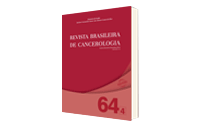Protein Adequacy versus Nutritional Status of Adult Oncology Patients in Intensive Care Unit
DOI:
https://doi.org/10.32635/2176-9745.RBC.2018v64n4.201Keywords:
Enteral Nutrition,, Neoplasms, Nutritional Status, Dietary Proteins.Abstract
Introduction: Adequate nutrition can reduce complications, length of hospital stay, and improve patient outcomes. Objective: To evaluate the adequacy of the protein prescription in enteral nutritional therapy for cancer patients and to compare the protein nutritional prescription with the specific recommendations available for oncology, according to the current literature. Method: This is a retrospective quantitative study. The data of the research were obtained through the map of daily use by the Nutritionist. Results: 54% of the patients were women and 46% were men. 41% of women had breast cancer and 21% of men had lung cancer. The nutritional risk score 3 was prevalent in adults and the elderly, of both sexes. Eutrophic adults accounted for 64% and undernourished elderly 50%. The average protein requirement for eutrophic adults was 1.5 g ptn/kg; for malnourished 2.1 g ptn/kg; for overweight 1.4 g ptn/kg and for the obese 1.8 g ptn/kg. For malnutrition in the elderly, the mean protein requirement was 1.4 g ptn/kg, for eutrophic 1.5 g ptn/kg and for obese 1.5 g ptn/kg. No evaluated result presented statistical significance. Conclusion: The malignancy of the underlying disease, age and the presence of nutritional risk suggest greater need to increase the amount of nutritional supply. It highlights the need to use protein modules to adjust nutritional prescription, especially to obese patients.









